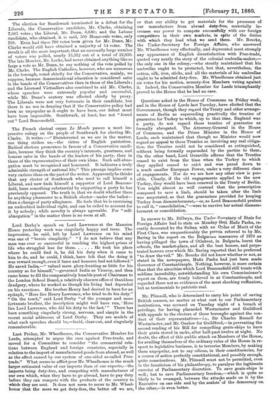Last Friday, Mr. Wheelhouse, the Conservative Member for Leeds, attempted
to argue the case against Free-trade, and moved for a Committee to consider "the commercial rela- tions between England and foreign countries, especially in relation to the import of manufactured goods from abroad, as well as the effect caused by our system of one-sided so-called Free- trade." What seems to afflict poor Mr. Wheelhouse is the much larger estimated value of our imports than of our exports,—the imports being duty-free, and competing with manufactures of our own which, when they have to go abroad, have to pay duty before they can compete with the products of the country to which they are sent. It does not seem to occur to Mr. Wheel- house that the more we get duty-free, the better off we are, or that our ability to get materials for the processes of our manufacture from abroad 'duty-free, materially in- creases our power to compete successfully with our foreign competitors in their own markets, in spite of the duties with which they load what we send them. Mr. Bourke,. the Under-Secretary for Foreign Affairs, who answered Mr. Wheelhouse very effectually, and deprecated most strongly any appearance of English dissatisfaction with Free-trade,. quoted very neatly the story of the colonial umbrella-maker,- the only one in the colony,—who stoutly maintained that his umbrellas ought to be protected, but that, nevertheless, the cotton, silk, iron, sticks, and all the materials of his umbrellas ought to be admitted duty-free. Mr. Wheelhouse obtained just six votes for his motion, seventy-five Members voting against it. Indeed, the Conservative Member for Leeds triumphantly proved to the House that he had no case.


































 Previous page
Previous page